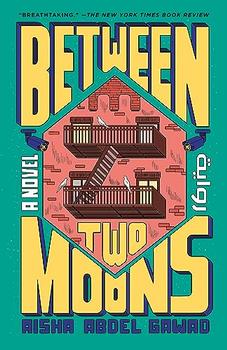Summary | Excerpt | Reviews | Beyond the book | Read-Alikes | Genres & Themes | Author Bio

A Novel
by Aisha Abdel GawadBetween Two Moons opens on the first morning of Ramadan. Twin sisters Amira and Lina are sleeping soundly when their father cries, "Wake up, ya binti." While Lina attempts to continue sleeping, he ushers Amira's attention across the street, where the police are raiding a Libyan cafe and arresting its owner, Abu Jamal. This incident plunges Amira, and by extension Lina, into social and political awareness. It also sets a tone that underscores the novel as a whole, conveying a looming sense of being observed and a constant fear that for Muslims living in a post-9/11 America, nowhere is safe from watchful, hateful eyes.
The story takes place in Bay Ridge, a Brooklyn neighborhood and immigrant enclave consisting of Arab American families, stores, mosques and community centers. The girls' father, Kareem Emam, runs the local market, and their family is well-settled in the area. Amira and Lina have just graduated high school and are trying desperately to balance the responsibilities of Ramadan (see Beyond the Book) with their newfound access to adulthood. This becomes exponentially more difficult upon the sudden early release of their estranged brother, Sami, from prison. He left the family a rebellious boy, and comes back a stoic, pious man. Amira senses something strange, not trusting his sudden reform. Unsure how to navigate this new family dynamic, the sisters cling to each other for safety and understanding. Through Sami, her job at the Center — a community resource for new immigrants — and an unexpected hate crime directed at their local mosque, Amira contends with institutionalized racism and the possibility of government surveillance in Bay Ridge.
Amongst it all, Amira and Lina are just beginning to grapple with their search for identity and autonomy. Lina, an aspiring model, clings to the attention of men in dark, throbbing nightclubs. Amira, on the other hand, just wants to be "unrecognizable, untrackable, untraceable." Both sisters, in a way, are searching for the same thing: themselves. They want to escape Bay Ridge and the pressure "to ditch [the] cutoffs and halter tops for a nice, modest abaya." Yet they struggle with a sense of fidelity to their family and culture, not wanting to abandon them as they feel increasing scrutiny from "those people, out there in the world, who didn't know us and despised us."
The book remains in the third person, but chapters vary between the characters they follow. Amira is the primary protagonist: The reader experiences events mostly through her eyes and she grapples the most with her sense of self and individuality. She is often charged with the care of her more irresponsible twin, and takes on the burden of investigating the mysterious details surrounding Sami's return. Her perspective tunes the reader in intimately to the goings-on of Bay Ridge and the emotions of the cast of characters. However, shifts in point of view to Lina, Sami and occasionally others, while at times jarring, ultimately give additional, necessary perspective from outside of Amira's limited perception.
Gawad challenges readers to recall their own teenage years, to remember the fight for self-discovery and how directionless it feels to occupy that strange realm between adolescence and adulthood, and she explores what it means to be a Muslim youth in America today. She brings a tenderness to what on the surface appears to be a fraught tale, taking readers into the lives of the Emam family as they experience stigma, loyalty, love, suspicion and betrayal. Above all else, family ties hold this novel together. The Emams are a beautiful example of strength and love through distress. Gawad shows that despite the persecution and fear beset upon the community of Bay Ridge, there is joy, laughter and love flourishing there.
![]() This review
first ran in the July 12, 2023
issue of BookBrowse Recommends.
This review
first ran in the July 12, 2023
issue of BookBrowse Recommends.

If you liked Between Two Moons, try these:

by Amira Ghenim
Published 2025
A finalist for the 2021 International Prize for Arabic Fiction, a compelling saga of two families that illuminates the lives of women in modern Tunisia.

by Jonathan Escoffery
Published 2023
A major debut, blazing with style and heart, that follows a Jamaican family striving for more in Miami, and introduces a generational storyteller.
Your guide toexceptional books
BookBrowse seeks out and recommends the best in contemporary fiction and nonfiction—books that not only engage and entertain but also deepen our understanding of ourselves and the world around us.